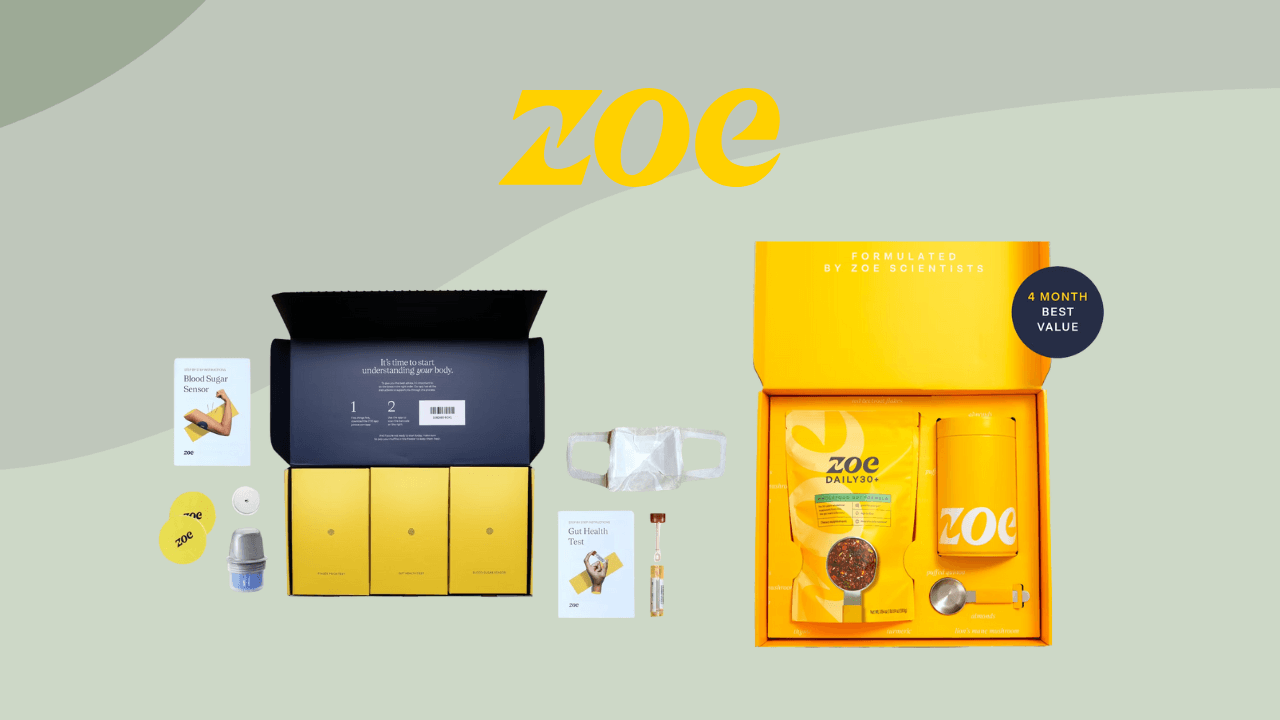

Zoe operates in the personalized health and nutrition space, focusing on helping you better understand how your body responds to food, blood sugar levels, and gut microbiome. Expanding on these insights, Zoe provides access to customized nutrition programs, at-home test kits, and tailored nutrition guidance.
The brand’s offerings include a mix of personal fitness tracking, app-based programs (Zoe app), and data interpretation services, which are integrated into a subscription model. However, can Zoe effectively deliver personalized nutrition insights grounded in scientific data?
In this review, we provide a detailed analysis of Zoe’s core offerings, testing procedures, app functionality, advantages, and potential limitations. To provide broader insights, we also listed some essential factors on which we evaluated Zoe.
Co-founded by Professor Tim Spector and Jonathan Wolf, Zoe provides access to customizable nutrition services. Rather than providing generic dietary guidelines, Zoe offers personalized dietary advice based on your gut microbiome, blood fat, and blood sugar responses.
At the core of Zoe is a research program called PREDICT. Conducted in collaboration with researchers at Harvard and Stanford, the PREDICT studies revealed that no two people process food in the same way, even when eating identical meals. Building on this, Zoe developed an at-home testing kit that analyzes your stool, blood, and glucose levels using a continuous glucose monitor (CGM). Zoe then uses the data to provide precise food recommendations through the Zoe app.
Zoe also provides the Daily30+ supplement, which could help support daily nutritional needs, promote gut health, and support sustained energy release. The brand also offers access to the MenoScale Calculator, which aims to provide a better understanding of menopause symptoms.

The Zoe Membership is a data-driven nutrition program that pairs at-home testing with a personalized mobile app experience through the Zoe app. After signing up for the membership, you receive at-home test kits with accessories required to collect the stool and blood samples. Instructions and step-by-step guides are also included alongside the kit to support convenience in sample collection. Stool samples are analyzed to identify the types and levels of your gut microbes, which may help Zoe shape a tailored nutrition plan.
Zoe analyzes your blood glucose levels in real time, which may indicate how different foods affect your energy and blood sugar levels. A blood fat test is also included, which requires you to collect a small blood sample after a meal. Labs then analyze the sample to assess how your body handles lipids (fat) by assessing your triglycerides and cholesterol levels.
The makers suggest completing your first day of testing within 2 weeks of receiving your kit. Once your results are ready, the Zoe app translates the data into personalized insights. It offers meal scores for various foods, along with resources for meal planning and recipes tailored to your biology.
According to the official site, Zoe membership is available in two pricing plans (Start and Core). The Start plan is of a 4-month duration and includes a one-time test kit fee of $294 and a $24.99 monthly recurring fee for the duration of the plan. Zoe’s Core plan is of a 12-month duration, which also costs $294 upfront for the test kit but a $9.99 monthly recurring fee afterwards.
The Zoe MenoScale Calculator is an online self-assessment resource that aims to help you better understand the symptoms experienced during perimenopause and menopause.
As per the official site, MenoScale includes a 20-question digital questionnaire focused on common menopausal symptoms, such as fatigue, night sweats, irregular periods, or hot flashes.
For each symptom experienced, you need to rate it based on how it affects your life (0=not at all, 1=a little, and 5=extremely). All the ratings then receive a score out of 100, where higher scores may reflect a greater symptom burden.
The data from MenoScale may help you better recognize and interpret your own menopausal experiences, which may also highlight the most disruptive menopause symptoms.
You can retake the MenoScale ratings over time to observe how your score changes following lifestyle adjustments, such as dietary changes, improved sleep, or the use of hormone therapy.
Daily30+ by Zoe could help support gut microbiome balance, improve energy levels, and support daily nutrition needs.
As per the official site, one scoop (15g) of Daily30+ comprises a mix of 30 plant-based nutrients, including dietary fibers, nuts, seeds, mushrooms, legumes, and fruits.
The Daily30+ formula includes fiber-rich ingredients like pumpkin seed, sunflower seeds, quinoa, and chicory root (inulin), which may support gut health.
For example, chicory root contains inulin (a prebiotic fiber) that may feed gut-friendly bacteria, which may promote better digestion and improved nutrient absorption. Pumpkin seeds provide magnesium and zinc, which are essential for enzyme function involved in both digestive processes and ATP (energy) production in cells.
Daily30+ also contains a mix of functional mushrooms, such as chaga, reishi, shiitake, and cordyceps. Chaga and reishi mushrooms comprise antioxidants like polyphenols and betulinic acid, which may reduce gut inflammation and support digestion. Shiitake provides ergothioneine and B vitamins, which could help your cells make energy and keep your gut lining strong.
Herbal ingredients in the Daily30+ formula include parsley, cumin, rosemary, and thyme. Cumin helps your digestion by boosting bile production, which may break down fats and support nutrient absorption. Turmeric may improve energy levels by lowering inflammation and helping bodily cells use glucose more efficiently for fuel.
Daily30+ also contains nuts like walnuts, almonds, and hazelnuts. Walnuts supply your body with omega-3 fats, which could support brain health and reduce inflammation. Almonds contain vitamin E and magnesium, which may help protect your cells and support muscle and nerve function.
According to the official site, Daily30+ is gluten-free, vegan, and contains no added sugar or salt. The makers describe that Daily30+ has a nutty, savory flavor, allowing it to blend seamlessly into everyday meals.
Zoe provides a data-driven approach to nutrition that moves beyond generic diet plans by using your body’s unique biological responses to guide recommendations.
The brand provides an at-home test kit that measures three core biomarkers, which are your gut microbiome composition, blood sugar response, and blood fat levels. These results help Zoe understand how your body processes different foods, allowing for targeted dietary suggestions tailored specifically to you.
What makes Zoe’s approach stand out is the scientific scale behind it. The brand powers its recommendations using machine learning models trained on data from the world’s largest ongoing nutrition study.
Once your samples are analyzed, the Zoe Health App delivers personalized insights, providing food scores, scan-based analysis of meals, and week-by-week nutrition plans designed to help you make better daily choices. You also gain continuous access to expert nutrition coaches, who can guide you through the process and help you develop sustainable habits.
Thus, Zoe’s testing, digital guidance, and science-backed products give you a personalized and holistic way to improve your nutrition, with ongoing adjustments that reflect your specific needs, preferences, and fitness goals.
Zoe’s brand approach includes a commitment to protecting your data. It means that when you take part in Zoe’s at-home testing, such as providing blood or stool samples, your information is handled with privacy in mind. The samples require home collection, thereby limiting third-party handling and avoiding the need for in-person clinic visits.
As part of Zoe’s privacy policy, the brand follows major data privacy regulations like the GDPR in the UK and EU, and applies HIPAA-aligned practices in the U.S. Such adherence could ensure that your health information, including sensitive data like your gut microbiome and blood fat responses, is stored securely on the Zoe platform and only used for specific, stated purposes. Zoe also shares detailed privacy policies, giving you clear access to how your data is managed, stored, and details of the privacy principles followed.
Zoe brand solely relies on a subscription-only model. You cannot access the nutrition programs, at-home test kits, or formulations from Zoe without signing up for a recurring subscription plan, which completely removes the option of a one-time purchase.
For example, subscription to a premium plan of Zoe called the Zoe Plus costs $15.99 monthly and $99.99 yearly. Although the subscription plan provides access to customized nutrition plans and an ad-free experience, it requires paying periodic subscription fees, which may add up costs over time. Such a lack of flexibility may be inconvenient, especially if you are only interested in trying the Zoe program once or reviewing your test results without committing long-term.
The Zoe brand promises personalization in its platform and app experience, but some customer reviews from Reddit indicate that Zoe lacks the personalization it claims to provide. Instead, the recommendations from Zoe often resemble generic nutrition advice, which did not feel personalized to their health goals, lifestyle, or cultural background.
From a usability standpoint, the Zoe app has drawn repeated criticism on Reddit. For instance, some users experienced technical glitches with the Zoe app, especially with the food tracking feature, which often failed to function properly after app updates. A few consumers also found the app’s recipe builder “frustrating,” while others noted that they gave up on using the Zoe app altogether due to poor reliability.
These combined issues of surface-level personalization and unstable app functionality can make it harder for you to get consistent value from the Zoe program, especially when you're paying for a premium service that promises precision and ease.
When comparing the Viome and Zoe brands, both differ in the range of at-home test kits they offer. Viome provides multiple specialized at-home test kits, including Gut Intelligence™, Full Body Intelligence™, and Oral Health Intelligence™, which may cover analysis of different health aspects (like gut microbiome, oral health, and full-body health). Meanwhile, Zoe offers a single, integrated test kit that evaluates gut microbiome health, blood sugar response through continuous glucose monitoring, and blood fat levels using a dried blood spot sample.
The scoring systems used by both brands also reflect different priorities. Viome delivers 20–50+ granular scores related to gut, cellular, oral health, and biological aging, which may offer detailed insights into multiple physiological areas. Zoe, on the other hand, focuses primarily on how the body responds to food, using test results to generate food scores based on glucose, blood fat, and gut microbiome responses.
Pricing structures further show a point of contrast between the Viome and Zoe brands. For example, Viome maintains pricing transparency across its services, as the Gut Intelligence test starts at $229, while the Precision Supplements from Viome cost $149/month. On the other hand, the Zoe Start (4-month) subscription plan costs $294 for the at-home test kit and $24.99 monthly afterwards. However, Zoe does not disclose the pricing details for its Daily 30+ supplement, which may limit transparency.
The app experiences offered by each brand also differ in scope. Viome delivers digital access to test results along with monthly updates and food/supplement recommendations as part of a subscription. Zoe also offers an interactive app with food scanning, personalized recommendations, recipes, food scores, and even access to consultations with nutritionists.
Scientific validation backing each brand also takes a different form. Viome highlights its use of CLIA-certified laboratories for sample processing, machine learning models, and the use of RNA sequencing technology. Meanwhile, Zoe emphasizes evidence from in-house studies and randomized controlled trials like PREDICT and BIOME.
When comparing the Ombre and Zoe brands, they diverge on aspects like the range of formulations/services, core focus, and pricing. Ombre provides multiple formulations in the form of probiotics and prebiotics to support various health interests, such as gut health, immunity, energy levels, and metabolism. Some flagship formulations from Ombre include Healthy Gut, Endless Energy, 3-in-1 Probiotic+, and Metabolic Booster, among others. Meanwhile, Zoe provides only a single formulation called Daily 30+, which aims to support digestion, energy levels, and nutritional needs.
Ombre and Zoe differ in the scope and structure of their at-home test kit offerings. For instance, the Ombre brand provides at-home microbiome testing focused primarily on the gut and vaginal microbiomes. It offers the Gut Health Test and Vaginal Health Test kits, which are also available alongside formulations (as bundles), such as Gut Reset Bundle and Super Greens Bundle. On the other hand, Zoe delivers only one at-home test kit that can help evaluate multiple aspects of metabolic health, including gut microbiome analysis, blood sugar levels, and blood lipid levels.
The underlying technology utilized by the at-home test kits also sets the two brands apart. Ombre’s Gut Health test kit utilizes 16S rRNA sequencing targeting the V3–V4 regions to identify bacteria and derive personalized insights.
Meanwhile, Zoe’s test kit uses shotgun metagenomic sequencing, which goes beyond bacterial identification and may capture the presence of other microorganisms such as archaea, fungi, and viruses.
Personalization experience is also different across Ombre and Zoe. Ombre provides downloadable reports and a dashboard to offer food and probiotic suggestions based on your microbial profile. Zoe extends the experience through the Zoe app that continuously updates food scores, microbiome data, and metabolic responses based on test results and data input.
When evaluating Zoe’s brand credibility, we considered both the brand’s scientific foundation and its standing across third-party review platforms.
Zoe has built its identity around offering personalized nutrition programs, which are driven by its BIOME and PREDICT research studies.
On Trustpilot, Zoe maintains a 4.2 out of 5 rating based on over 12,200+ reviews. Many users appreciated Zoe’s in-depth testing, personalized reports, and the insights provided. However, some reviewers noted recurring concerns around delayed delivery of at-home test kits, high program costs, and inconsistent customer support.
Zoe holds a “C” rating with the Better Business Bureau (BBB), primarily due to unresolved complaints on the platform. The failure to respond to customer grievances raises questions about Zoe’s responsiveness and conflict resolution practices.
As part of our evaluation, we examined Zoe’s returns and refund policy to assess the brand’s flexibility, customer protection, and transparency. Zoe adopts a strict “all sales are final” policy, which means orders cannot be canceled once they’ve entered the preparation phase, typically within 24–48 hours after completion. The limited cancellation window offers minimal flexibility, especially in cases where you may reconsider shortly after placing an order.
We also considered how Zoe handles issues related to product quality or damage. While the brand does not offer general refunds, it does provide a channel for addressing specific concerns through its support team.
However, on the subscription side, Zoe does offer some degree of autonomy. You can manage and cancel ongoing subscription plans directly through your Zoe account dashboard. Still, this functionality does not extend to refunds for already processed payments.
Zoe provides a customized approach to nutrition by factoring thorough analysis of your gut microbiome, blood sugar levels, and blood fat responses using an at-home testing kit. The program includes weekly dietary suggestions, individualized food scores, and access to the ZOE app, aiming to help you make food choices based on your biological data.
However, Zoe’s subscription-based model structures the service around continued engagement, which may be suitable if you're looking for long-term support.
Feedback from independent platforms such as Reddit indicates a mix of user experiences with the app’s interface and food tracking features. While some found the program insightful, others reported occasional technical issues, suggesting variability in how users interact with the platform.
The initial testing process typically takes 4–6 weeks from sample collection to results. This timeline requires some patience and consistency with meal tracking, especially during the testing phase. If you're considering Zoe, understanding this process can help set expectations about whether the brand’s model fits your personal health goals.
Contact us at [email protected] or follow @leafsnap on Twitter! View our Privacy Policy.